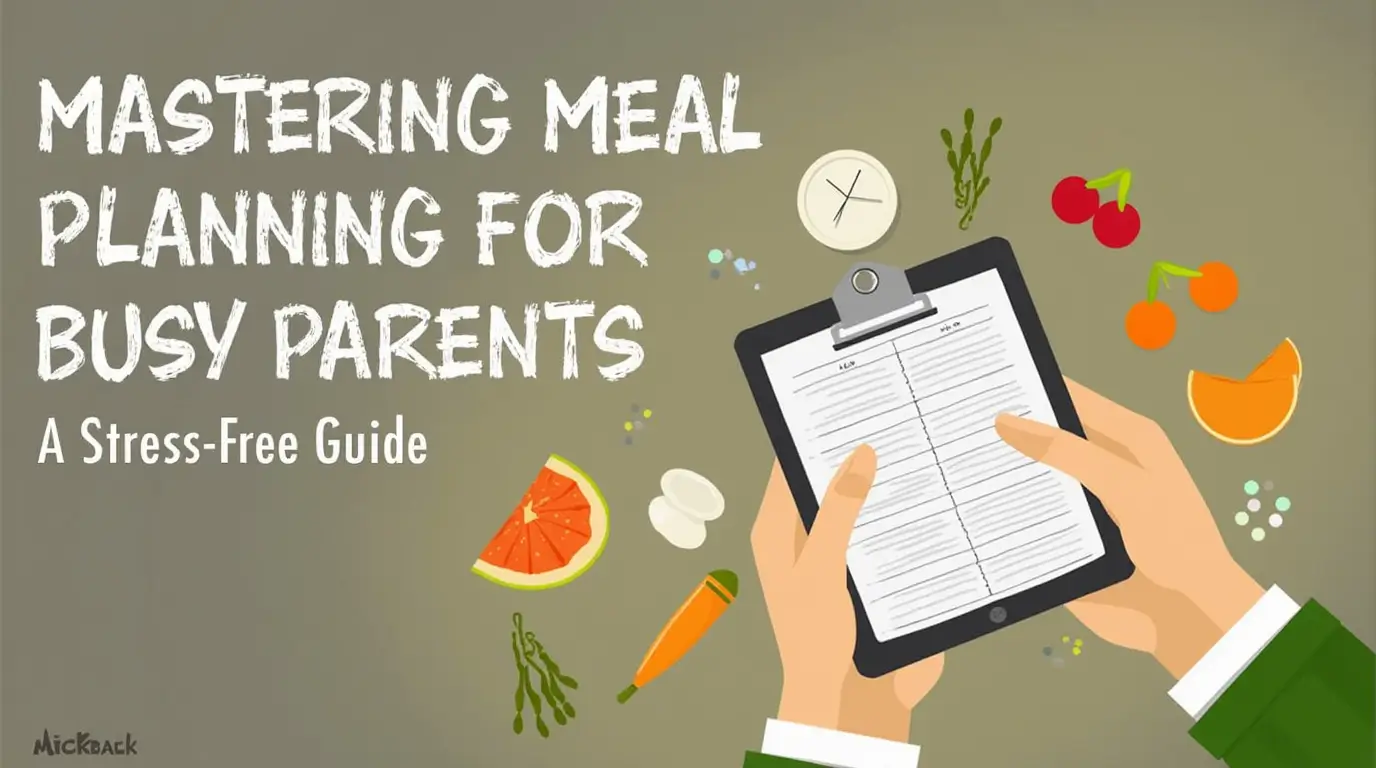Introduction
Let’s face it: juggling work, kids, and household chores can make meal planning feel like climbing Everest without oxygen. But fear not! With a sprinkle of organization and a dash of creativity, you can conquer the kitchen chaos. Ready to dive into the art of meal planning for busy parents? Let’s get cooking!
Thank you for reading this post, don't forget to subscribe!The Power of Meal Planning for Babies & Toddlers
Why Bother with Meal Planning?
Have you ever stared blankly into the fridge at 6 PM, wondering what’s for dinner? Meal planning swoops in like a superhero to save the day. It:
- Saves Time: No more daily grocery runs or last-minute takeout orders.
- Cuts Costs: Planning helps you buy only what you need, reducing food waste.
- Promotes Healthy Eating: You’re more likely to prepare balanced meals when you’ve thought ahead.
Getting Started: Tips and Tricks
1. Set Aside Planning Time: Dedicate a specific weekly time to plan your meals. Many parents find that weekends work best. Grab a cup of coffee, sit down with your calendar, and map out the week’s meals.
2. Assess Your Schedule: Consider your family’s activities:
- Busy Days: Opt for quick meals or slow-cooker recipes.
- Leisurely Days: Try new recipes or involve the kids in cooking.
3. Create a Master Recipe List: Compile a list of your family’s go-to recipes. This becomes your meal planning arsenal, making it easier to choose dishes each week.
4. Make a Shopping List: Once your meals are planned, jot down the necessary ingredients. Stick to this list to avoid impulse buys and ensure you have everything on hand.

Mornings can be one of the busiest times of day, so having ready-made quick breakfast options can be a game-changer. You don’t need anything fancy; even the most straightforward recipes can be incredibly nutritious and delicious. A mashed banana with oats or a blend of applesauce and yogurt can make a satisfying breakfast for your little one.
If you have extra minutes, try steaming some sweet potatoes the night before. In the morning, mix a spoonful with a bit of baby cereal or puree it for an instant, nutritious breakfast. You could also prepare an egg-based muffin packed with vegetables over the weekend and store them in the fridge for easy grab-and-go options.
Lunches Your Baby Will Love

Lunch can be fun to introduce your baby to new flavors and textures. Try out some easy finger foods like cooked carrot sticks or soft-cooked peas. These are nutritious and great for developing your baby’s fine motor skills as they learn to pick up food and feed themselves.
Pureed soups are also a wonderful option for lunchtime, especially on cooler days. You can make a big batch of carrot or butternut squash soup, divide it into small portions, and freeze them for future meals. Heat up a portion during mealtime, and your baby has a delicious homemade baby recipe ready to enjoy.
Easy and Nutritious Dinners for Busy Parents
When dinner time rolls around, you’re probably ready to unwind, so a quick yet nutritious meal is ideal. Steamed vegetables with mashed beans or lentils make a nutrient-rich dinner that’s easy to prepare. Try blending a few different veggies together, like carrots and peas, to make a colorful, flavorful puree.
You can also introduce proteins like soft-cooked chicken or fish, which are great sources of nutrients for growing babies. If your little one is ready for finger foods, shred some cooked chicken and serve it with small cubes of steamed sweet potato. Remember to keep things simple and nutritious, focusing on a balance of proteins, healthy fats, and carbohydrates.
Batch cooking is an absolute must for busy parents. By cooking in larger quantities, you can save time throughout the week by having meals pre-prepared and ready to serve. Make a big batch of pureed sweet potatoes, carrots, or apples, then freeze them in small, baby-sized portions. When it’s mealtime, simply thaw out a portion, and you’re good to go.
Freezing meals also allows you to offer your baby a wider variety of foods without spending extra time cooking each day. You can rotate frozen meals so that your baby gets a mix of flavors and nutrients without added effort on your part. This is especially helpful if you’re introducing new foods and want to test for any sensitivities before committing to larger portions.
Grocery List Staples for Your Baby Meal Plan
Stocking your pantry with essential ingredients makes meal planning a breeze. Some key items for baby meal prep include oats, bananas, sweet potatoes, and avocados. These versatile ingredients work well in a variety of recipes, from purees to finger foods. You’ll also want to keep a selection of fresh vegetables and fruits on hand for blending and mashing.
To save even more time, consider purchasing frozen fruits and vegetables, which are equally nutritious and perfect for last-minute purees. Baby-safe spices like cinnamon and mild herbs can also add variety to your baby’s meals, helping to introduce new flavors graduall

As your baby grows, their nutritional needs evolve. During the early months of solids introduction, purees and simple mixtures are best. But as they progress, you can incorporate more complex textures and flavors. Include a balance of proteins, vegetables, and grains in each meal to support their growth and development.
For example, you might start with pureed carrots or apples, then transition to mashed lentils or small pieces of soft-cooked pasta. Offering variety helps develop their palate and makes mealtime exciting for you and your baby. Aim to offer at least three different colors of foods each day to ensure a broad range of nutrients.
Tips for Staying Consistent with Meal Planning
Consistency is key when it comes to meal planning. Set aside a specific time each week to plan meals, shop for ingredients, and do any advance prep you can. Sticking to a routine will help you feel organized and reduce the pressure of last-minute meal decisions. Plus, the more you plan, the easier it becomes!
If you miss a week, don’t worry, meal planning doesn’t have to be perfect. Even small efforts like preparing a few batches of puree or having pre-cooked vegetables ready can make a big difference. Remember, meal planning is about making life easier, not adding stress.
Why Delicious Baby Recipes Are Ideal for Busy Parents
At the end of the day, every parent wants the best for their baby. By planning ahead and using delicious baby recipes, you can ensure your baby gets healthy, balanced meals without spending hours in the kitchen. From purees to finger foods, the right recipes make all the difference, helping you provide nutritious meals in a manageable way.
If you’re just starting out, try introducing one new recipe each week. As you grow more comfortable with meal prep, you’ll find that a few simple strategies can make mealtime a breeze. Remember, every meal you make for your baby is an opportunity to nourish and bond, creating memories that will last a lifetime.
FAQs
How can I make meal planning less overwhelming?
What if my schedule changes unexpectedly?
How do I deal with different dietary preferences in the family?
Conclusion
Meal planning for busy parents doesn’t have to be a Herculean task. With some forethought and flexibility, you can streamline your kitchen routine, save money, and keep your family well-fed. So, roll up those sleeves and embrace the art of meal planning!

